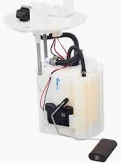Several factors can lead to a failed fuel pump, and knowing them will help you avoid an expensive repair. A common issue of this function failing is running the vehicle too low on fuel. Automotive Maintenance Magazine reports that nearly 20% of fuel pump failures are attributed to habitual operation on the tank less than one quarter full. The pump in the tank is cooled and lubricated by fuel, so when it runs dry (fuel level too low), due to non on-flat-surface driving this heat builds up causing premature failure.
Excessive use of fuel pumps leads from clogged up filters. When a filter is clogged, it restricts fuel flow and makes the pump work harder than necessary. Eventually, this causes the GS to overheat and not operate effectively. A clogged fuel filter can also reduce how long the fuel pump lasts — RepairPal says it can cut into a new-age in-tank design with up to 40% less life, so that repair is pricey.
Fuel pump failure due to electrical problems Issues with the wiring or relay system account for about 15% of fuel pump failures. This occurs because the pump receives uneven power delivery, which results from faulty wiring. Fuel system electricals are also vulnerable to voltage variations; any lowering of the dial by your alt will result in maximum fuel flow through the pump, yet at lower (overall) pressure.
Another reason could be the bad fuel available in that station. If opening a fuel tank inlet becomes clogged, this can lead to contamination through dirt, debris and water damaging the pump. According to a study by The National Institute for Automotive Service Excellence (ASE), fuel contamination cause as much as 10% of all component failures in the U.S. Modern fuel pumps are built to much tighter tolerances, and any debris that gets through can poison the pump with clogs or corrosion damage on internal components.

Fuel pumps will wear out eventually due to age. Normally, fuel pumps last from 100,000 to about 150,00 miles. Naturally, all these have a life period after which tear and wear lead to failure. According to Edmunds, replacement of a fuel pump is simply part of the 100,000-mile service for an average car; about one in eight cars will need its original fuel pump replaced within this interval.
In addition, incorrect installation or use of an inappropriate pump can shorten the shelf life. Putting an improper-specified pump on your car can cause fuel-pressure discrepancies that might sour performance! TechAuto claims that some 8% of fuel pump failures are down to poor fitment or use of inferior quality aftermarket parts.
On the performance aspects for instance, if a pump does not deliver enough amount of fuel it might hard fault on high power applications and will take down any motor that demand more. Engines that produce a lot of power require pumps with flow rates in excess of 255 liters per hour (LPH), where most regular automotive engines need roughly half this—at around 90-110 LPH. If a pump cannot meet these demands fuel-starvation can occur under hard acceleration, making the pump work to its limit & will eventually fail.
Those who are needing to replace or upgrade their Fuel Pump need not doubt the performance quality and reliability. When you shop with brands like Fuel Pump, a name synonymous with reliability and quality, it means that your vehicle is getting the attention it deserves.